by Jill & Sarah | Oct 7, 2017 | In The Loop
Literatura
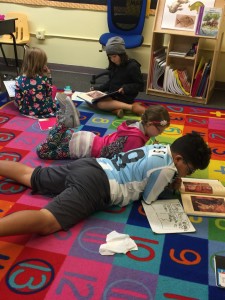
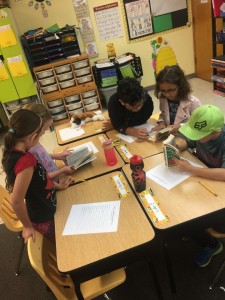 This week we read Rugby and Rosy. Our objectives were:
This week we read Rugby and Rosy. Our objectives were:
- understand what auxiliary verbs are
- use comprehension strategies such as making connections, visualizing, and Self-questions to construct meaning from the story during our first read
- use comprehension skill cause and effect as we read the story the second time
Matemáticas
This week we finished our second chapter and started chapter 3 Addition up to 10,000. Our objectives:
- Add greater numbers without regrouping
- Add greater numbers with regrouping hundreds
History & Geography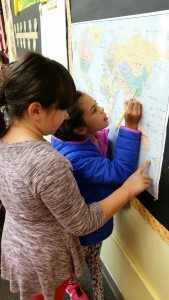
Social studies with Ms. Marci.
This week we in our World Rivers unit we talked about how wildlife is supported on rivers and how rapids and waterfalls affect river travel. We also began a gathering information on all the rivers that we have learned about in this unit in preparation for our unit test next week.
Our objectives were to:
• explain how rivers provide good habitats for wildlife
• refer to a map and describe locations and major features of the Amazon, Orinoco, Mackenzie Rivers, Iguaçu, Paraná, Congo, and Yukon Rivers.
• explain how waterfalls make River navigation difficult
• describe ways that boats can travel on rivers with waterfalls
• understand the meaning of the following domain-specific vocabulary: piranha, humid, waterfall, Arctic Ocean, Northern Hemisphere, migrate, landlocked and rapids
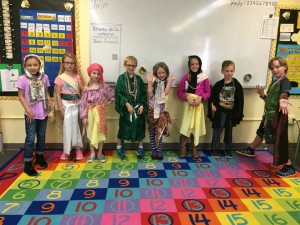 Social Studies with Ms. Laura:
Social Studies with Ms. Laura:
We began our study of Ancient India by learning about the Indus River valley and the people who lived there. We made jewelry and dressed up! We were introduced to Hinduism, learning about its origins and some of its gods. We even practiced some yoga.
Science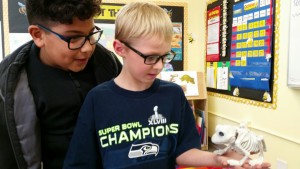
This week in our Animal Classification domain we learned more about the group of amphibians and read up on reptiles, on Friday we began an interesting experiment comparing the skin of amphibians to that of reptiles.
Our objectives this week were to:
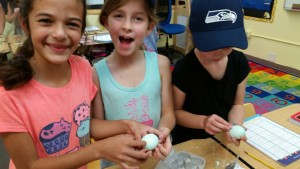
Amphibians and Reptiles
pollution experiment
• identify characteristics of amphibians
• compare and contrast fish and amphibians
• identify basic characteristics of reptiles
• classify particular animals as reptiles
• compare and contrast two groups of vertebrates
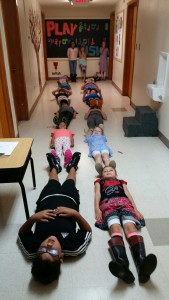
How long are anacondas?
English Word Work
We took our spelling test on Friday. Everyone is working hard and the test reflect this! In grammar this week we worked on auxiliary verbs/ helping verbs.
by Jill & Sarah | Sep 30, 2017 | In The Loop
Literatura
This week we read La casa del árbol. Our objectives were:
- understand what verbs are
- use comprehension strategies such as making connections, visualizing, and self-questioning to construct meaning from the story during our first read
- use comprehension skill compare and contrast as we read the story the second time
Matemáticas
This week we continued working with mental math and estimation. Our objectives were:
- Use different strategies to add 2-digit numbers close to 100 mentally
- Round numbers to estimate sums and difference
- Use front-end estimation to estimate sums and differences
History & Geography
Social studies with Ms. Marci
This week we in our World Rivers unit we considered a river viewed from above and dangers and navigation of rivers. Some of our big questions were the difference between the source and the mouth of a river, as well as what dangers boats face on rivers. Together as a group we began filling in a chart on interesting facts about World Rivers.
Our objectives were to:
• describe the mouth and the source of a river
• refer to a map and identify the location of the Murray River
• list at least two ways people use the Murray River
• describe the dangers on the Mississippi River and the Ob River
• locate the Mississippi River and the Ob River on a map
• understand the meaning of the following vocabulary and phrase: drainage basin, orchard, vineyard, pasture, sandbar, current, tributary, swamp, wasteland, and “river pilot”
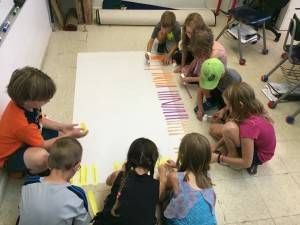 Social studies with Ms. Laura
Social studies with Ms. Laura
This week we completed our study of The Geography Of The Americas by learning about the seven more countries in South America. We reviewed our unit by talking about North America, Central America, The West Indies and South America. We had our assessment and worked together on a project about elevation, plotting the heights of cities close by, capitals of many of the countries studied in this unit and three mountain ranges: The Appalachians, The Rockies and The Andes. We enjoyed an ‘end of unit’ celebration!
Science
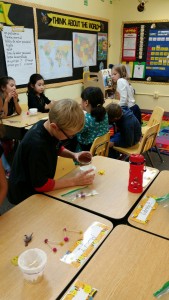
Demonstrating how gills work for fish.
This week in our Animal Classification domain we learned about two groups of animals, amphibians and fish. Students worked on different classification charts in order to better understand how each group of animals has unique characteristics. We also finished our animal shape poems. 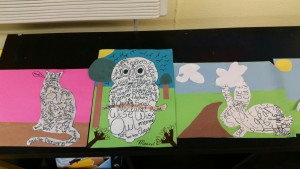
Our objectives this week were to:
• explain that scientists classify animals in order to study them and show relationships
• identify basic characteristics of fish and amphibians
• classify particular animals as fish
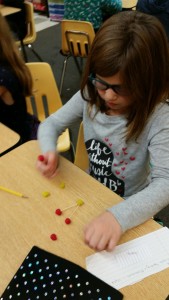
H2O molecule model
• classify particular animals as amphibians
• compare and contrast two groups of vertebrates
English Word Work
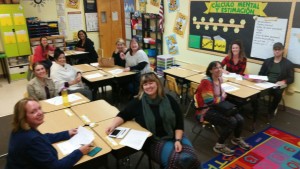
Thanks for attending curriculum night everyone!
We took our spelling test on Friday. Everyone did great! We had quite a few perfect scores. A couple of students wrote stories with their spelling sorts for homework this week, I was quite impressed with the creativity these spelling words could inspire! In grammar we worked on verbs; present, past, future tense. On Mondays the class will have the opportunity to go to our school library. They do not have to check out a new book each week. I’m encouraging students to check out chapter books that they can take home and read for a while. I’m reminding Students to try to find a special place to put their book in order to keep track of them over the weeks that they have the book checked out.
Specialists
Character Education: I so enjoyed having the students bring in one of their “favorite things” over the past few weeks! It’s such a fun “get to know you” activity. This took a bit more time than anticipated, so we are finishing up our theme on Manners next week and then will move on to our next theme: Friendship, Cooperation, and Teamwork. In K-3rd grades, we will be reading some great books including The Name Jar by Yangsook Choi, and Amos and Boris by William Steig. Our poem will be a seasonal one, called Something Called the Wild Geese by Rachel Lyman Field. Be sure to check the bulletin board to see more books, as well as the poem, song, and quote we’ll focus on for the next several weeks.
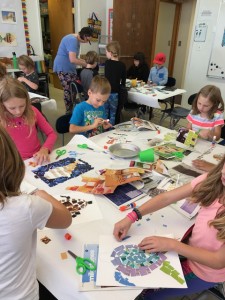 Art: The 2nd and 3rd graders started the school year with some fabulous sunflower paintings which we’ve all enjoyed on the bulletin board!
Art: The 2nd and 3rd graders started the school year with some fabulous sunflower paintings which we’ve all enjoyed on the bulletin board!
Next we learned about Ancient Roman mosaics, which are pictures made of glass or stone tesserae (tiles). The students learned that mosaics were most often used on floors and walls of ancient Roman buildings and homes.
After choosing a simple animal shape (fish, turtle, lizard), the students used magazine pages to cut out paper “tiles” to fill in the shapes. Then they made a background of somewhat contrasting colors. Lastly, they made a mosaic border. Some of these mosaic animals are camouflaged in their settings, but they’re all very creative! Check them out on the bulletin board at school!
We also had time to start on an Australian Aboriginal Dot painting, using q-tips as our painting tools. The students are using the same animal shape as their mosaic, so we will be able to compare and contrast these different art techniques.
October Music with Ms. Erin
In September the Second and Third Grade class learned about Quarter, Half, and Whole notes, the American composer John Philip Sousa, Marches and how to march to a beat, 4/4 time signature, played fast and slow rhythms on the drums, learned the meaning of verse and refrain, sang Solfeggio, played the C Major scale on the electric piano, and sang the following songs:
– I’ve Been Working on the Railroad
– Li’l Liza Jane
– Clementine
– Good Bye Old Paint
– Alouette
For October we will be focusing on:
– Reading treble clef notation
– Time signatures 3/4 and 2/4
– Clapping, drumming, and reading eighth notes
– Singing a ’round’
– Recognizing brass instruments in a symphony orchestra by listening to Rossini’s ‘William Tell Overture’ and Mozart’s Horn Concertos
by Jill & Sarah | Sep 23, 2017 | In The Loop
Literatura
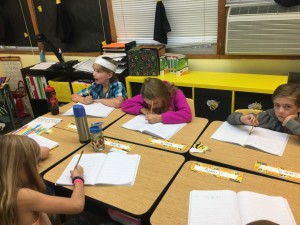
Journal writing!
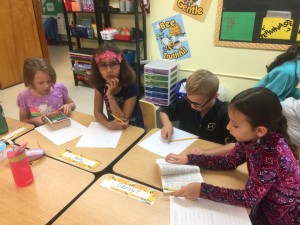
Using dictionaries to define our spelling!
This week we read Niña ángel, niña dragón. Our objectives were:
- understand what pronouns are
- use comprehension strategies such as self-questioning, visualizing, and Summarizing to construct meaning from the story during the first week
- use comprehension skill Cause and Effect as we read the story the second time
Matemáticas
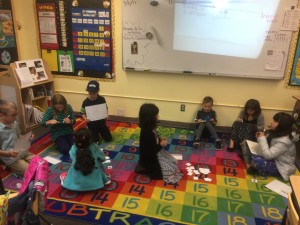
Playing mental math games!
This week we finished our first math chapter and began our second Mental Math and Estimation. Our objectives were:
- add 2-digit numbers mentally with or without regrouping
- subtract 2-digit numbers mentally with or without regrouping
History & Geography
Social studies with Ms. Marci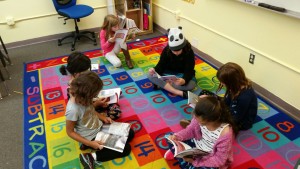
This week we in our unit on geography we began looking at world rivers. Students each have a copy of the World Rivers Student Reader and are reading chapters together and on their own. Each person also spent some time researching and gathering information to add to our “living” map including rivers, animals, and other significant landforms.
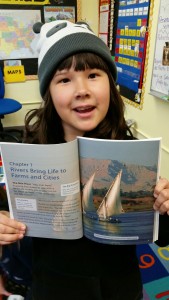
New readers!
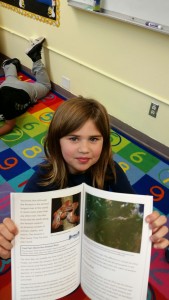
Rivers
Our objectives were to:
• understand how to use and construct maps, globes, and other geographic tools to locate and derive information about people, places, and environments
• locate and label the four oceans and seven continents on a map
• measure straight line distances on a map using a map scale.
• use the maps in the atlas of the Student Reader to find geographic information
• describe two ways that Rivers bring life to farms and cities
• compare the Nile River and the Yellow River
• understand the meaning of: river, riverbank, source, irrigation, silt, and flow
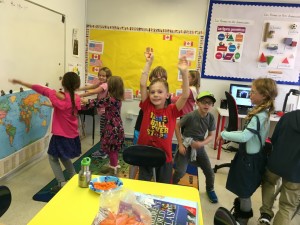 Social Studies with Ms. Laura
Social Studies with Ms. Laura
We studied The West Indies (The Caribbean), locating many islands and talking about some characteristics and history of the area. We learned about some countries in South America (Brazil, Colombia, Venezuela, Guyana, Suriname and French Guiana.
Science
This week in our Animal Classification domain we finished looking at of warm-blooded and cold-blooded animals and read a chapter on vertebrate animals .We also worked on our animal shape poem.
Our objectives this week were to:
• classify particular animals as cold-blooded or warm-blooded
• interpret information about animal characteristics and their classifications from diagrams, charts, graphs, and graphic organizers
• classify and organize the characteristics of five groups of vertebrates
English Word Work
We took our second spelling test on Friday. Overall the class did very well on their first spelling test. Almost everyone turned in their homework on time too! Good work to all those that did. We have an added flashcards to the weekly activities , these are worth 10 points. In grammar this week we worked on pronouns, singular, plural, subject, and object.
by Jill & Sarah | Sep 9, 2017 | In The Loop
Literatura
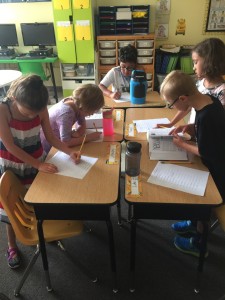 What a great first week of school! It was great seeing how excited everyone is for the brand new school year.
What a great first week of school! It was great seeing how excited everyone is for the brand new school year.
This week we reviewed procedures and expectations for Language Arts. We also jumped right into our first unit, La Amistad (Friendship). Our objectives were:
- Familiarize ourselves with the textbook, including the table of contents and glossary
- Understand and discuss our unit theme
- learn and practice cursive i and t
- review our dictionary skills and use them to define our spelling vocabulary
- Write our first journal entry discussing goals for the year
We are also focusing on using our planner this year. Please make sure to encourage your student to show you their planner, this will also be where we write important dates and events!
Matemáticas
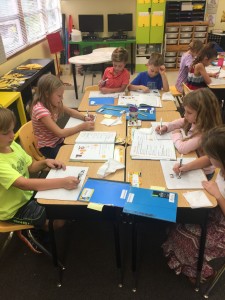 This week after discussing procedures and expectations during math, we jumped into our first chapter, Numbers up to 10,000! Our objectives were:
This week after discussing procedures and expectations during math, we jumped into our first chapter, Numbers up to 10,000! Our objectives were:
- Complete “Este soy yo. Por los numeros” activity
- Use base-ten blocks to show numbers
- Express a number in different forms including normal form, word form, and expanded form
- count to ten thousand
- count on by ones, tens, hundreds, and thousands
Students also received a math packet, this is for at home reinforcement and does not need to be turned in. Everyone did a great job working with numbers and getting used to 2nd/3rd level work!
History & Geography
It was so good to see everyone’s smiling faces in our bright and sunny classroom on the first day of school. I can already tell it’s going to “bee” a great year! On the first day we worked on reviewing procedures and expectations for our classroom. Each person in class came up with some personal goals/affirmations they want to work on this year. Check them out on our Bee bulletin board in the hall. 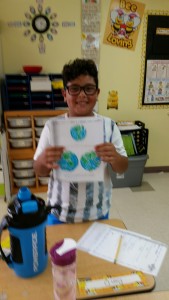
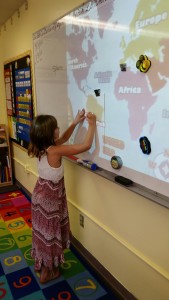
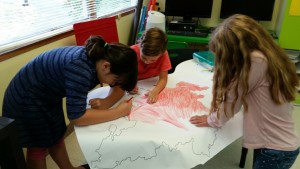
Social studies
This week we began our first Social Studies unit on geography. In this unit we will be reviewing the basics of locating the continents and oceans, finding the equator, and locating the polls. We will also be using map symbols and keys to design our own class “living” map to which we will be adding information throughout the year.
Our objectives were to:
• understand how to use and construct maps, globes, and other geographic tools to locate and derive information about people, places, and environments
• identify the four major oceans: Pacific, Atlantic, Indian, Arctic
• identify and label the seven continents
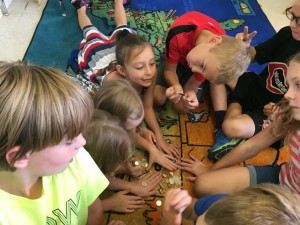
Identifying those Canadian coins!
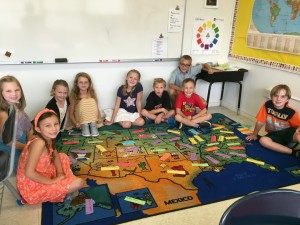 H&G with Ms. Laura
H&G with Ms. Laura
Welcome to second grade History and Geography! We started our first unit, Geography of the Americas, by matching the fifty states in the United States of America with their nicknames. We also identified some characteristics shared by many maps, such as compass rose and map key. For the United States and Canada, we studied and started coloring maps (noting states on the U.S. map and territories and provinces on the map of Canada), handled some actual coins from each country, listened to the national anthems and drew the flags.
Week of September 11 -15, 2017
We will continue our study of North America by learning about Mexico and The Caribbean. We will also talk about The West Indies.
Science
Our first science domain this year will be on classification of animals. We will learn about five groups of vertebrae, why scientists classify animals into groups, and the characteristics by which they make these determinations. In years past this has been a very exciting unit with lots of interesting activities. Our class has already come up with several things they would like to do with this domain.
Our objectives this week were to:
• observe and describe basic characteristics of an animal
• identify cold blooded/warm-blooded and vertebraes/invertebrates as important characteristics used to classify animals
• explain that scientists classify animals by common or shared characteristics and that they do so in order to study animals and show relationships
English Word Work
We will begin our spelling program next week. The students took a spelling assessment on Friday. Spelling activities this year will be done at home and students will be responsible for turning in their activities on Friday for both Spanish and English. They will have a weekly spelling homework check off sheet in their Take Home Folders. This sheet will list activity choices to be done and point value for each.
Grammar this year will be a preview or review of what is being learned in Spanish Language Arts.
Wonderful Wednesday Specialists
ART NEWS
It was great seeing everyone back at school on Wednesday! A special THANK YOU to Alora’s mom, Stacy for returning to help out in the Art Room!
The students observed real sunflowers (planted by my grandson Landon), and we looked at Van Gogh sunflowers and Georgia O’Keefe flower paintings. The students then drew and painted their own sunflower blossoms. I hope to display their beautiful paintings next week!
If you would like to help out in the Art Room, there is a yellow VOLUNTEER SIGN-UP sheet posted on the bulletin board by the Art Room door. The 2/3 class meets from 12:30-1:30. Even though Stacy helps out every week, it’s always great to have extra help!
As a reminder, it’s a good idea to have your students wear OLDER CLOTHES on Wednesdays that you don’t mind getting paint, oil pastel, marker stains on 🙂
UPCOMING SEPTEMBER ART UNIT: Mosaics
The students will learn about ancient Roman Mosaics and then try some different techniques and materials to create their own mosaic art.
MUSIC with Ms. Erin
I’m excited to be teaching music this year at SWS!
For the month of September I will be introducing the Kindergarten/First class to music ideas involving high and
low sounds, fast and slow tempo, basic rhythms, and starting Solfeggio singing.
2nd/3rd grade will be reviewing and learning those same musical ideas, adding new knowledge
including more extensive Solfeggio practice, and learning all about the famous composer Johann
Sebastian Bach!
4th/5th grade will be reviewing all they have learned, adding more complex rhythms, and learning
about the American composer John Philip Sousa.
I will bring in my electric piano for all grades to play music games and sing along with on the 3rd week of
September. All grade levels will be given custom made music theory coloring pages to have fun with and
help them exercise the music terms they learn. All grade levels will learn to sing popular songs like
Twinkle, Twinkle, Little Star; On Top of Old Smokey; This Little Light of Mine.

 This week we read Rugby and Rosy. Our objectives were:
This week we read Rugby and Rosy. Our objectives were:
 Social Studies with Ms. Laura:
Social Studies with Ms. Laura:






















